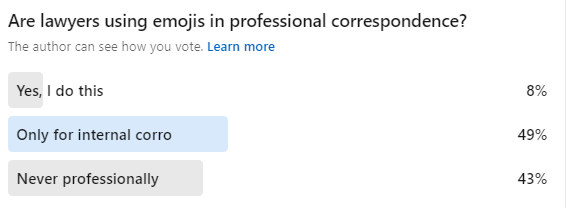Despite a Canadian court’s ruling last year that the “thumbs-up” emoji was sufficient evidence to validate a contract, a snap poll on Lawyers Weekly indicates that practitioners Down Under aren’t rushing to use emojis in professional correspondence.

As reported by Lawyers Weekly in July 2023, a Canadian judge found the thumbs-up emoji sent in a text exchange was enough to validate a binding contract, noting it was the “new reality” that courts would have to meet new digital challenges.
“I find under these circumstances a [thumbs-up] emoji is an ‘action in electronic form’ that can be used to allow to express acceptance,” Justice Timothy Keene said at the time.
His Honour went on to say that courts should be ready for the use of such text moving forward.
“Counsel argues the courts will be inundated with all kinds of cases if this court finds that the [thumbs-up] emoji can take the place of a signature. It appears to be a sort of public policy argument.
“… this court cannot (nor should it) attempt to stem the tide of technology and common usage – this appears to be the new reality in Canadian society, and courts will have to [be] ready to meet the new challenges that may arise from the use of emojis and the like,” Justice Keene said.
Speaking to Lawyers Weekly following the case, Slater & Gordon head of industrial and employment law Andrew Rich said that courts closer to home should also be ready to adjust to the new normal of digital communications.
“An Australian court can consider this legal decision when making a ruling; it can be thought of as a suggestion or advice from another court,” he said.
He added that while it would not be a “binding precedent”, there may be “common scenarios” where a court could have the same issue.
“For example, your boss could send you a new contract, and you send a thumbs-up back intending to confirm you received it, and when you read it, you disagree with the terms.
“If that matter goes to court, there’s nothing stopping a judge [from] citing this decision,” Rich said.
With just over one year having passed since that Canadian case and the subsequent commentary around it, Lawyers Weekly was interested in whether practitioners have taken to this more informal, and certainly emotive, form of communication as part of any workplace or official correspondence, and the extent to which such use may be mainstream.
To that end, Lawyers Weekly posted a poll on its LinkedIn page, seeking to find out how many lawyers will use emojis in various legal professional settings:

The snap poll does not, of course, produce a scientific or quantitative research finding. However, it does offer an interesting insight into lawyers’ prima facie views on the use or otherwise of emojis in professional settings.
With less than one in 10 (8 per cent) of lawyers responding to the poll indicating that they use emojis in various professional scenarios, it would appear that practitioners Down Under are – at least not yet – willing to embrace such new-age text.
Nearly half of those responding to the poll (49 per cent) indicated that they would use emojis for internal correspondence (e.g. emails, text messages, Slack channels) with their colleagues, which seems to suggest at least some warming to more informal communication styles in the workplace.
However, more than two in five (43 per cent) denoted they would never use emojis in a professional setting. Over time, that number may soften – particularly if Australia, like Canada, sees a court case that determines the validity of emojis in documentation such as contracts – but currently, a sizeable demographic of the profession seems to think that emojis are for personal use only.
One IP lawyer, commenting on the poll, reflected that he would use emojis “very occasionally” in correspondence with clients or colleagues. It would “not be appropriate”, he added, for any court or official correspondence.
That seems to sum up how Australian practitioners feel about emoji use – at least for now.

Jerome Doraisamy is the managing editor of Lawyers Weekly and HR Leader. He is also the author of The Wellness Doctrines book series, an admitted solicitor in New South Wales, and a board director of the Minds Count Foundation.
You can email Jerome at: